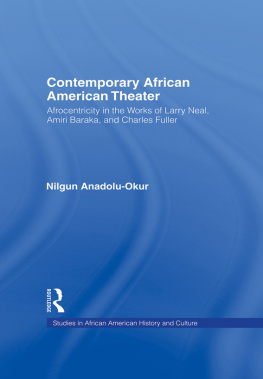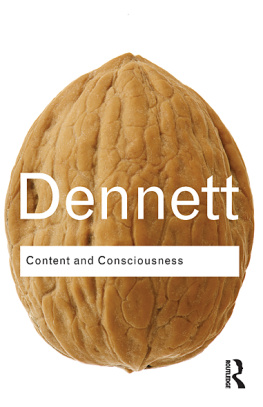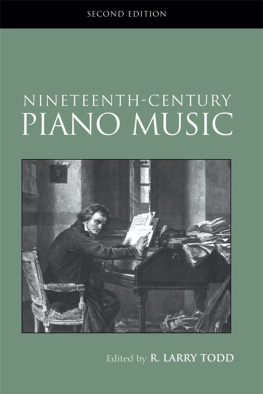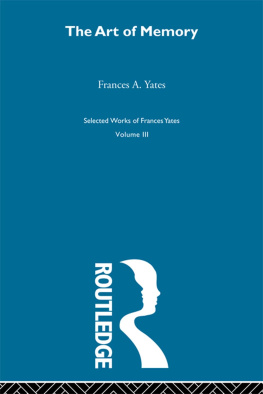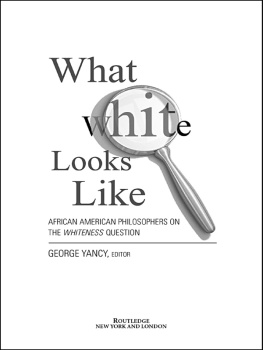STUDIES IN
AFRICAN
AMERICAN
HISTORY AND
CULTURE
edited by
GRAHAM RUSSELL HODGES
COLGATE UNIVERSITY
A ROUTLEDGE SERIES
CONTEMPORARY
AFRICAN AMERICAN
THEATER
AFROCENTRICITY IN THE WORKS
OF LARRY NEAL, AMIRI BARAKA,
AND CHARLES FULLER
NILGUN ANADOLU-OKUR
Published by Routledge
270 Madison Ave, New York NY 10016
2 Park Square, Milton Park, Abingdon, Oxon, OX14 4RN
Transferred to Digital Printing 2010
Copyright 1997 Nilgun Anadolu-Okur
All rights reserved
Library of Congress Cataloging-in-Publication Data
Anadolu-Okur, Nilgun, 1956
Contemporary African American theater : Afrocentricity in
the works of Larry Neal, Arniri Baraka, and Charles Fuller /
Nilgun Anadolu-Okur.
p. cm. (Studies in African American history and
culture)
Includes bibliographical references and index.
ISBN 0-8153-2872-9 (alk. paper)
1. American dramaAfro-American authorsHistory and
criticism. 2. American drama20th centuryHistory and criticism.
3. Neal, Larry, 1937- Criticism and interpretation.
4. Baraka, Imamu Amiri, 1934- Criticism and interpretation.
5. Fuller, CharlesCriticism and interpretation. 6. American
dramaAfrican influences. 7. Afro-Americans in literature.
I. Title. II. Series.
PS338.N4A45 1997
812.5409896073dc21
97-16545
Publisher's Note
The publisher has gone to great lengths to ensure the quality of this
reprint but points out that some imperfections in the original may be apparent.
Dedicated to the loving memory of my father, Sahap Anadolu,
and to my son, Ali Murat, who believed in Mom.
Contents
Preface
They rarely study African American dramatists, an African American playwright once said to me in response to my observation that the emphatic themes of African American drama are much different from the themes of European American drama. Indeed, this playwright's comment has since been confirmed in that I have found little critical analysis of African American theater based on theoretical aspects of drama. My research in this area was furthered during the years I taught American drama, with the help of some exceptional students. Subsequently, in 1988 a Fulbright post-doctoral research award at Temple University's African American Studies Department provided me with the opportunity to consolidate my concepts of African American drama. In this environment I was able to explore and discover the roots of African American theater. This undertaking has been both challenging and empowering.
Perusal of the texts of the Black Arts movement alongside those of the Black Theater movement provided a backdrop for my understanding of an African-centered world view. This inquiry soon evolved into the development of a framework for the critique of contemporary African American drama. Through reading texts by Larry Neal, Amiri Baraka, and Charles Fuller. I have been able to delineate the characteristics of this particular drama with a concomitant heightened appreciation of its value. More specifically, I have devised nine steps for the analysis of African American drama. The research has been rooted in and made possible by numerous factors: the study of Molefi K. Asante's works; the attainment of a position in the Department of African American Studies at Temple University, with its research environment devoted to Africalogical paradigms; and the full-time teaching of a diverse student body who have impressed upon me daily the power of their self-expression, both written and oral. Furthermore, immersion in this environment has strengthened my faith in the merits of multiculturalism.
Initially, the writings of Baraka seemed to provide the bulk of the material necessary to my book. Further research revealed, however, that Baraka's dramatic works allow for neither easy categorization nor straightforward comparison to works by other major African American playwrights. To illustrate: Baraka's ideas are definitely larger than the Black Arts movement itself, yet some of his work is far too indoctrinated to fit into a multicultural spectrum; nor do all his writings yield to a strictly African-centered interpretation. Meanwhile, another leader of the Black Arts movement, Larry Neal, is renowned as the precursor of the proponents of the African-centered world view. Charles Fuller enters the scene as one who continues a long tradition enriched by the developments that took place during the sixties' Black Arts and Black Theater movements. As many critics have observed, particularly in the wake of his 1982 Pulitzer-Prize-winning A Soldier's Play, Fuller excels in his style, mastery of technique, and commitment to truth in his material. Most significantly, his work yields to a new formulation which acknowledges African-centeredness in every aspect of life as it relates to African people worldwide.
The lessons inherent in Fuller's faithfulness to the preeminence of Africanness in African matters, without the need to claim universality or superiority, have guided this analysis. Add to this a milieu in which the multicultural characteristics of this nation are increasingly discussed and debated, and the necessary analytical path becomes even clearer. Moreover, pluralism without hierarchy, the main tenet of an Africalogical approach, points ironically to a possible reconciliation between the general construct of European American theater and drama, and African American theater and drama.
In view of these premises, I propose, firstly, that it is critical to examine the roots of contemporary African American drama in a different, more illuminating light. Secondly, African American drama needs to be evaluated using its own aesthetic standards and critical judgments, rather than as a supplement or hybrid within the genre of American drama. It is only through these two steps that African American drama can truly be understood in all its richness and complexity.
Introduction
Good morning, Revolution:
You're the very best friend
I ever had.
We gonna pal around together from now on.
Langston Hughes, Good Morning, Revolution
The drama of the African's presence in the United States is the fundamental backdrop for any discussion of the role and function of black theater in the history of American dramatic criticism. Each element in the creation of culture is represented in the larger context of kidnappings, beatings, riots, resistance movements, and deaths during the enslavement of Africans from 1619 to 1865. A concurrent dramatic development in social interactions can be seen in the forms of verbal styles and physical responses created to deal with the peculiarities of this overarching drama of millions of Africans held in bondage by whites in a land foreign to both. The mastery of cunning, verbal resistance, cleverness, deceit, laughter, mystery, joy, suspense, and challenge would become the calling card of the African American theater because behind this theater was always the larger American drama of a racial crisis.
Unsurprisingly, critical studies of American drama have almost always focused on the European American theatrical tradition, ignoring, in large part, African American drama. The prevailing attitude towards any genre of African American creative production has been one of condescension and negation. As Toni Morrison asserts in Playing in the Dark: Whiteness and the Literary Imagination:

